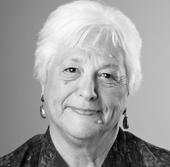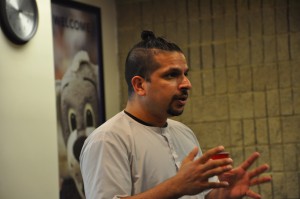
Sharon Litwin (photo by Jason Kruppa)
Editor’s Note: In honor and memory of Sharon Litwin, The Queen here at NolaVie, we will be publishing a piece from her every day for the next month. Sharon was an advocate and spokeswoman for arts, culture, people, and policies here in New Orleans. Her voice and sharp wit will be greatly missed.

Dr. Adi Nadimpalli
To hear Sharon Litwin Interview Dr. Adi Nadimpalli on WWNO, click here.
Reading about medical teams that go into war-torn places like Nigeria or Syria or fourth-world spots like Liberia or Sri Lanka, it is sometimes hard to understand why anyone would want to spend months in places so dangerous. These are not spots you can drop in on easily; these are far-flung regions with few resources and many hardships.
But it’s what Medecins sans Frontiers, known in English as Doctors Without Borders, is all about. It’s what Dr. Adi Nadimpalli says he is meant to do, when he’s not working and living in New Orleans, that is.
Born in India, Adi moved with his family to Tanzania, then to Libya, and finally to Chicago. That’s where he went to medical school after getting his undergraduate degree at UCLA. Like all medical school graduates, he hoped to be accepted into a residency program of his choice. He was thrilled when Tulane Medical School accepted him into its internal medicine program in 2001.
But by the end of that four-year residency, Adi was completely turned off by what he perceived to be a burdensome medical bureaucracy and the dysfunctional state of public health delivery processes in the city. He was, to put it mildly, burned out.
His Tulane residency came to an end in July 2005.
“You know, the residency and being in the city just beat me down,” Adi recalls. So at the end of his four years he decided he did not want to do primary care at all. Instead, he thought he would go into cardiology. But one month later he found himself in a post-Katrina world providing health care to a devastated New Orleans. Initially he was based in an emergency crisis center in Baton Rouge, and then, when part of the medical system cranked up again in New Orleans, working with Tulane University Community Health Center and Common Ground.
After a couple of months at that, Adi thought he would take some time off before a cardiology fellowship, and opted to go on a nine-month medical mission to Liberia with Doctors Without Borders. It would be, he figured, a great opportunity to experience medicine “in the field.” In fact, it was such an eye-opening experience that, after an initial exposure to the real value of primary care in the bush, Adi just kept on going back “into the field.” Sometimes he worked solo in the most rural parts of third-world countries, where there was no electricity, no running water, no telephones. Other times, he was part of a team.
One might ask why he would subject himself to such harsh conditions?
“It’s almost a cliché of your medical school application,” Adi answers. “As a physician you want to get to the core of the relationship between you and the patient; when I finally got to rural Liberia, it seemed so pure.”
Adi has served in Sri Lanka and Malawi, Mozambique and Nigeria. But he has always come back to New Orleans. For the past few years here, he has served as the Vice President of Doctors Without Borders in the United States, a purely administrative position in addition to his job as an emergency room physician.
But that’s about to change.
“I’m leaving my heart here,” he says, “But I’m actually leaving for the field. I am going back fulltime.”
What that means is that, for at least a year, Adi will be part of the Doctors Without Borders emergency team based in Paris, going wherever he is sent — basically living out of a suitcase. But, like all the field trips before, chances are Dr. Adi Nadimpalli will be returning to this city.
“New Orleans is a city that you can’t ever get the escape velocity to leave,” he says. “You always gravitate back towards it.”
For more information about Doctors Without Borders, go to www.doctorswithoutborders.org
 NOLAbeings Multimedia artist Claire Bangser created NOLAbeings as a portrait-based story project that marries...
NOLAbeings Multimedia artist Claire Bangser created NOLAbeings as a portrait-based story project that marries...  Voodoo in New Orleans: Reviving history: New Orleans fortune telling This article takes a deep dive into the history of Voodoo in New Orleans, its hybridization with Catholicism, and its present-day place in the city's culture. The author visits fortune-tellers in the French Quarter, using their guidance as a tool for introspection rather than a deterministic predictor of the future. Through her experiences in New Orleans, the author feels a mystical connection to both the past and the future.
Voodoo in New Orleans: Reviving history: New Orleans fortune telling This article takes a deep dive into the history of Voodoo in New Orleans, its hybridization with Catholicism, and its present-day place in the city's culture. The author visits fortune-tellers in the French Quarter, using their guidance as a tool for introspection rather than a deterministic predictor of the future. Through her experiences in New Orleans, the author feels a mystical connection to both the past and the future. 